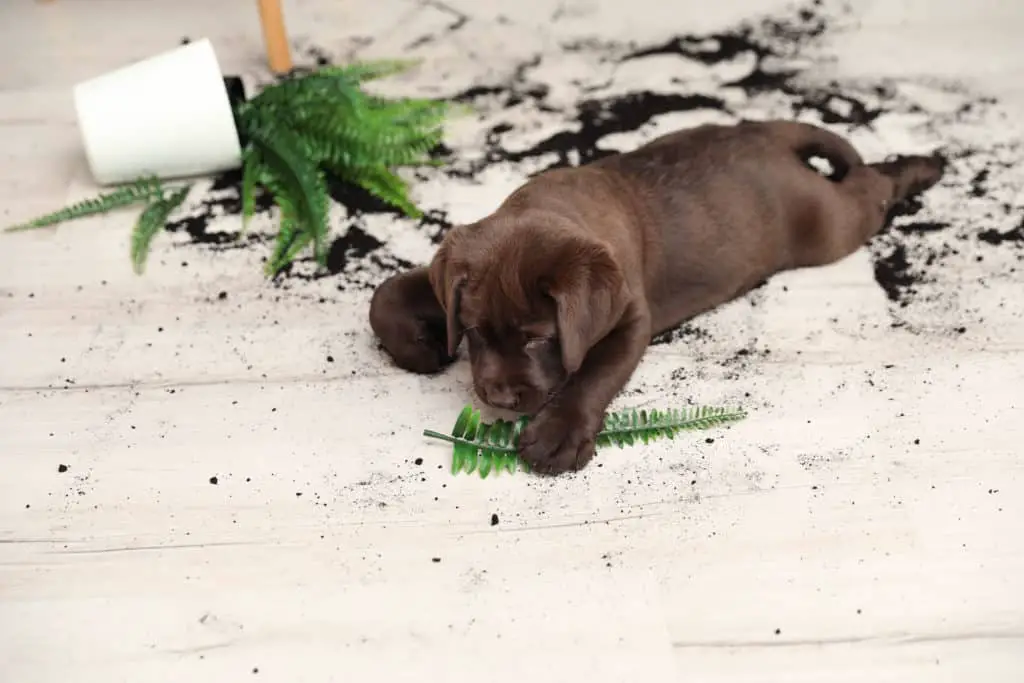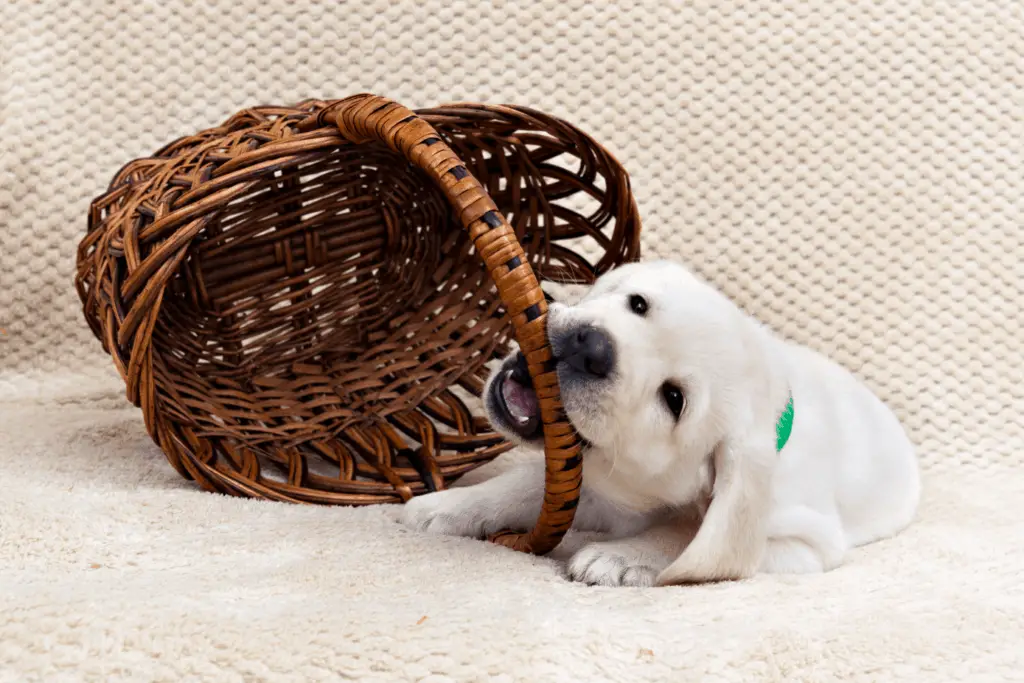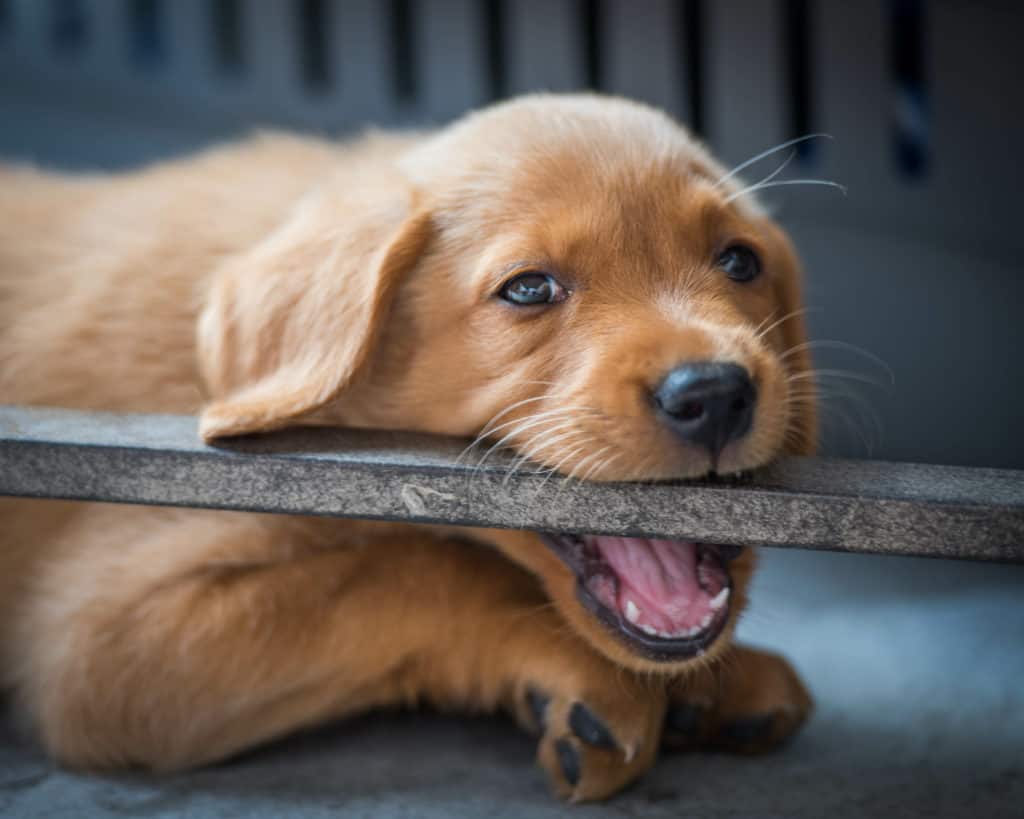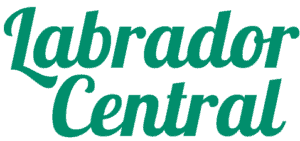
You just brought home a cute little Labrador puppy and are thinking now you’ll finally have the company of a dog that is sociable, charming, friendly, and enthusiastic. A true friend! And you are not wrong. Labs are all those things and that is why they are among the most popular dog breeds in the world.
But soon, you realize that your Lab puppy is becoming a handful. It has so much energy that you can barely rest. You always have to be on the lookout to prevent the pup from causing harm to itself or others, because it keeps running about all the time!
And now, you are wondering, when do labs calm down? Do not worry. Eventually, all puppies calm down and Labrador Retrievers are no different. Keep reading this article to find out how to deal with an overly energetic Lab puppy.

When Do Labrador Puppies Calm Down?
You may have been around a lot of dogs that aren’t Labs, and you would have seen them as puppies, running around, jumping with joy. But almost all of them settled down by the time they were 5-8 months old.
But here you are, trying to calm down your Labrador that is almost 10 months old, and its energy just doesn’t seem to wane! Rest assured that there is nothing wrong with your puppy. Labradors do take longer to calm down than most other breeds.
It is not uncommon for lab puppies to remain hyperactive till their first birthday. In extreme cases, your Lab won’t start to calm down until 18 months of age. Related: Why do Labradors eat so much?
How Do You Calm a Lab Puppy?
Just because Labradors generally take longer to settle down, it does not mean that you cannot try to calm them down sooner. If your pup is knocking things over too frequently and jumping at visitors for no reason, you may want to try some of these methods to bring down its energy to a manageable level.
Give Your Puppy a Chew Toy
Labrador puppies begin exploring with a great deal of enthusiasm right after they are born. One of the ways they do this is through their mouth and teeth (when they start growing them). This is why chewing off the corners of your home’s furniture, upholstery, clothes, etc. is a common activity with these pups.
To divert their attention from your furniture, you may give them a set of chew toys. Make sure to give your puppy plenty of chew toys so your pup doesn’t get bored with them.
Exercise Your Puppy Regularly
Blame it on their centuries-old hunting and fishing genes, but it is a common fact that Labradors are not ones to sit quietly. Puppies are even more so. The ancestors of today’s labs used to be busy with rigorous outdoor activities. But unfortunately, today’s urban life has placed a sedentary life on these active dogs.
This is another reason why Labrador puppies are hyperactive for so long as they don’t know how to expend their bubbling energy. What you can do is give your dog plenty of exercise in a regular and controlled manner. That way, your pup will be tired enough to not destroy your furniture.

How Much Exercise Does a Labrador Puppy Need?
This is not as easy to answer as it sounds. Each Labrador puppy is different and they have energy levels, you also have to take into account the type of exercise that your puppy does, a walk is not the same as playing fetch in the yard or playing tug of war in the living room.
But a general rule of thumb is to play with your puppy for 5 minutes per month of age, that is, if your puppy is 3 months old, he should play for 15 minutes at a time, then let him rest. Keep in mind that puppies do not know that they are tired so it is up to you to calm them down and make them take a nap.
A clear sign that your puppy is tired is that he will start biting your hands and will get more mischievous and troublesome than usual. If your puppy gets like this, take him to his bed and try to get him to rest, you can pet him so that he calms down more quickly.
Teach Your Puppy Basic Commands
Like all other dogs, training a lab puppy has to begin as early as possible. Labradors start recognizing basic commands at the young age of 3-6 months, so why not use some of these commands to calm them down? Teach your dog some simple commands such as “calm” or “relax” and ensure it understands and follows those commands.
You can also chart out a grooming routine and teach the dog to stay put when you are brushing its coat. As with all other forms of training, reward your dog for following your commands of calming down.
Do Not Reward Bad Behavior
When positive behavior gets rewarded (such as staying calm), your pup would eventually learn to do more of it. But if it is still destroying your furniture or jumping on people, and making your house unlivable and inhospitable, it is time to take charge.
Do not be afraid to put a leash around its neck if it overdoes negative activities. At an early stage, it is essential to establish that you are the owner and that the dog cannot oppose your control over it.
Give out a firm “No” when the dog starts biting off your furniture. Of course, you have to train your dog for it to understand that the word “No” means this behavior is unacceptable and is not going to fetch it any rewards. Related: Do Labradors bark a lot?
Give Your Puppy a Place to Rest Comfortably
Just as physical exercise is important for a lab pup, a good amount of rest is also equally essential. But the resting place for your lab pup has to be such that the dog looks forward to resting in that place.
So, set up its kennel or its room with toys and make sure the dog bed is comfortable. After all the energy-releasing exercises, if your pup has a good place to rest, it would want to calm down by itself, without you needing to reinforce it.
Provide Food Puzzle Toys When You Leave
Alright, you can keep an eye on your pup when you are at home. But what about when you have to leave for work? How on earth are you going to prevent your hyperactive pup from turning the house inside out?
You can look at some food puzzle toys that provide hours of entertainment for your pup while you are gone. Why do labs fall for it? Because labs are intelligent animals and need mental stimulation from time to time.
There are various kinds of puzzle toys on the market, some are chewable, while others are shaped as slow-feed bowls. Try out a few and see what your dog prefers.

Do Labs Calm Down After Being Neutered?
There is a common belief that neutering a pet dog changes its behavior, but in recent times, this has been seen to be untrue. Dogs should ideally be neutered only for birth control and not for aggression because often aggression is seen even in neutered pets. Hence, if you are thinking that your lab pup will automatically calm down after being neutered, that may not be the case.
When Should a Lab Be Neutered?
If not for behavioral reasons, then when should your lab be neutered? Well, it depends, and the best judge is always your vet.
Some veterinarians recommend neutering pet dogs before they reach sexual maturity to curb any unwanted reproduction. But neutering at an early age comes with some health risks as well.
Other vets are now suggesting that dogs should be allowed to sexually mature for proper mental and physical development before they are neutered. So, talk to your vet and understand the risks versus benefits of neutering early before taking a decision.
Why Is My Labrador So Hyper?
Pups typically grow out of the hyperactive stage as maturity kicks in, but some owners of Labradors complain that their dogs are hyper even when they are full-grown adults, and some are hyper even after they have reached senior age.
These dogs may never calm down and it may be in their genes to be active all through life. Try out some of the effective methods of calming your dog as discussed above. If all fails, you may want to visit the vet to rule out (or diagnose) underlying health issues or chronic anxiety.
Do remember that hyper or not, your lab is still your best friend for life and can be a loyal, loving pet if you provide the right circumstances.
Related Posts: Why Do Labrador Retrievers Love Water?

